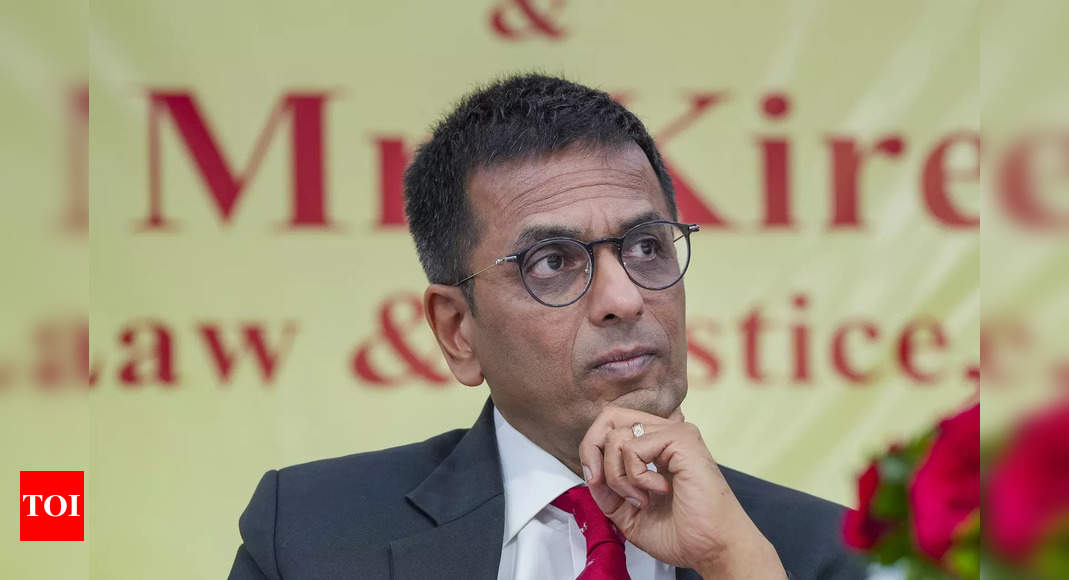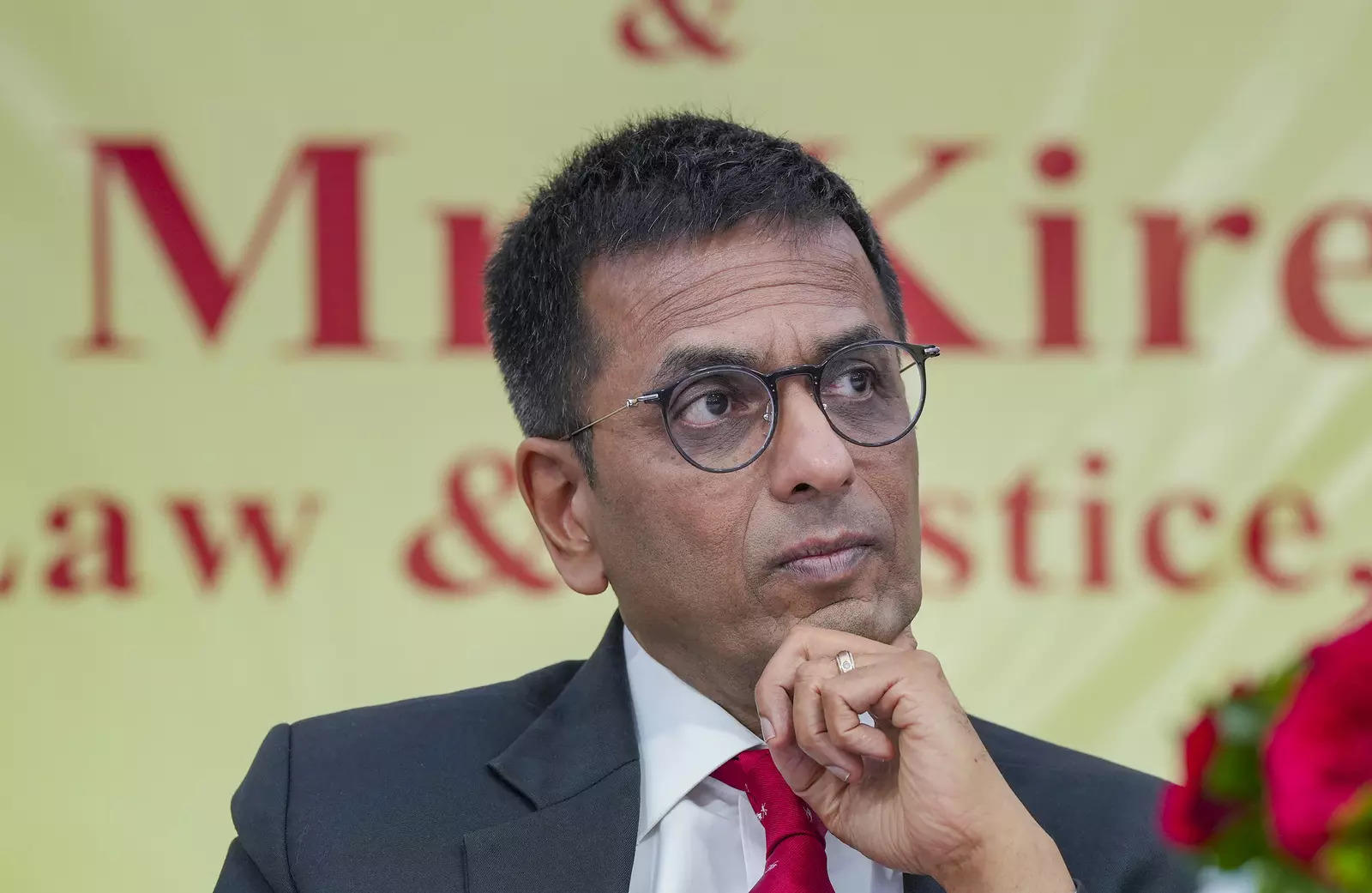[ad_1]
Chandrachud laid emphasis on the legal system’s need to recognise what ails the system, to prevent rising student suicides, saying “empathy is an essential ingredient in law and it is what separates a just society from an unjust one”.
“I am often wondering where our institutions are going wrong, that the students are forced to give up their precious life. Incidents of suicides of students from marginalised communities are becoming common,” he said, addressing the 19th Annual Convocation at NALSAR, Hyderabad. He mentioned how he recently read the news about the suicide of a Dalit student at IIT Bombay. “It reminded me about the suicide of an Adivasi student in National Law University, Orissa, last year,” said the CJI , noting that it’s important to realise that different students face different challenges.
These, said the CJI, “numbers are not just statistics”. “These are stories sometimes of centuries of struggle. I believe that if we wish to address this issue, the first step is to acknowledge and recognise the problem,” CJI Chandrachud said. “Sukhadeo Thorat, one of the senior-most educationalist of the country, has noted that if almost all those who have died by suicide in particular situations are Dalits and adivasis, then it shows a pattern, which we must question.”
The Chief Justice of India also gave a solution: “Recognise the problem, lay emphasis on empathy more than eminence.
E
mpathy is an essential ingredient in law and it is what separates a just society from an unjust one.”
The CJI said lack of empathy in educational institutions has adverse effects on students. “I have been emphasising on the mental health of lawyers, but equally important is the mental health of students. Not only must our educational curriculum inculcate a sense of compassion among students, but the academic leaders must also be sensitive to the concerns of students. When students leave their home, it becomes the responsibility of the educational institutions to establish a bond of institutional friendship with them.”
He called for changes in the model of legal education to make “empathy the core value”.
“Since independence, we have been focusing on creating Institutions of Eminence. But more than that, we need Institutions of Empathy, and judges, cannot shy away from social realities,” said the CJI, adding those in India have a crucial role in making a dialogue with the society, inside and outside the courtrooms – to push for social change.
He further said, “It is my sincere belief that with collective efforts, we shall be able to change the approach of legal education and profession. We must use the law to create a society that is truly just, where everyone is treated with dignity and respect, and where everyone has the opportunity to thrive. We must work together to shape the law in a way that reflects our shared values of fairness, equality, and justice.”
“Nurturing empathy can end the culture of eliteness and exclusion,” added CJI Chandrachud, saying “small steps” will go a long way.
He asked to do away with allotment of hostels based on entrance marks which leads to caste-based segregation. “Putting out a public list of marks along with social categories, asking for the marks of Dalit and adivasi students publicly to humiliate them, making a mockery of their English and physical appearance, stigmatising them as inefficient, not acting on incidents of abuses and bullying, not providing a support system, or reducing or stopping their fellowships, normalising stereotypes through jokes are some of the basic things which every educational institution must stop,” stressed the CJI, adding “in other words, practicing empathy requires institutional changes”.
The CJI further said, “We must ensure that the practice of law is done in a fair and equitable manner, without regard to a person’s race, caste, gender, religion, disability or sexual orientation.”
“It is by reshaping our legal education model that we will be able to make empathy a core value of our legal system,” said CJI Chandrachud.
Stating that “outlook of legal education must be to improve the quality of law colleges across the country, and not just a few institutions”, the CJI said sense of entitlement that NLUs are better than other institutions leads to unnecessary wastage of energy. “Instead, NLUs should be leaders in the field of legal education … NLU law students must not look down on their counterparts studying in other law schools.”
He also empathasised with fresh law graduates who face many challenges starting from getting into the chambers of good offices, the tendency of established lawyers and law offices to pay meager salaries, even lower than the minimum wages and extremely high fees for registration for State Bar Councils, to name a few. “If we, as a legal profession have to grow, we have to change our approach. We would have to move past the mindset that we are reaping as we had sowed …”
He also mentioned how the apex court is continuing to use technology that played a key role during the Covid pandemic to improve its infrastructure of access to courts and become “epitome of transparency”. The latest “auto-transcription of court proceedings by employing artificial intelligence (AI) is a step forward, he said and added ,“I think technology can allow us to take legal education to a mass level, so that law does not remain a field or profession of the elites. Teaching or study resources can be made available online publicly to students, even if that student is not enrolled in the law school. This can encourage quality learning everywhere.”
Chandrachud also said a panel will submit ways to make courts more disabled-friendly for greater inclusivity.
He finally exhorted the budding lawyers to also explore life outside law, giving example of his life. “I made it a habit to read literature other than law textbooks, and I can share that it has helped me in my career, firstly as a lawyer, and then as a Judge. As the Chief Justice, I often revert to what Atticus Finch, the protagonist in Harper Lee’s classic “To Kill a Mockingbird”, said, and I quote: “But there is one way in this country in which all men are created equal — there is one human institution that makes a pauper the equal of a Rockefeller, the stupid man the equal of an Einstein, and the ignorant man the equal of any college president. That institution, gentlemen, is a court … Our courts have their faults, as does any human institution, but in this country our courts are the great levellers, and in our courts all men are created equal.”
[ad_2]
Source link





